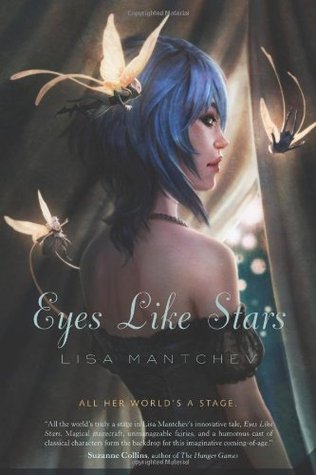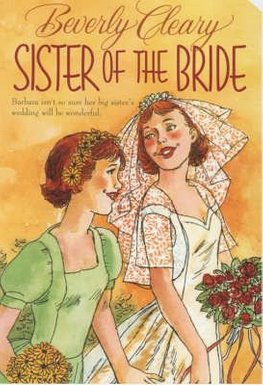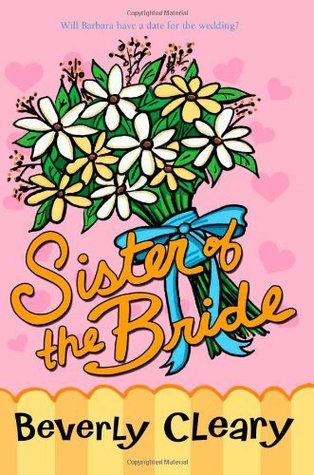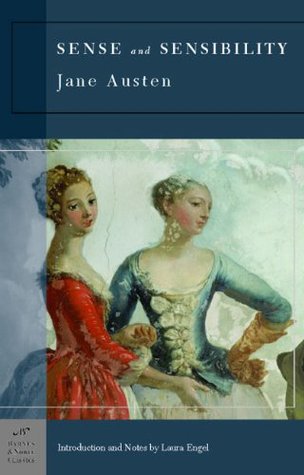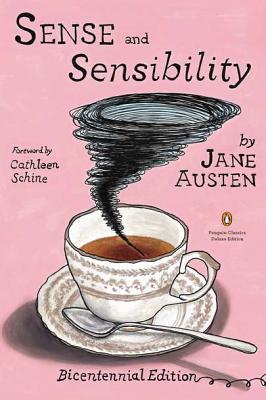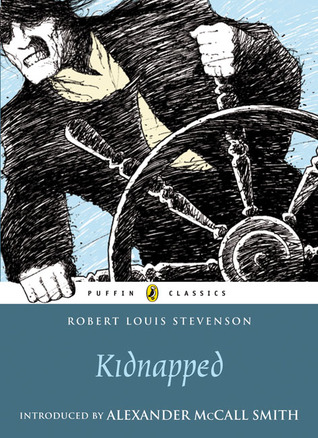Sense and Sensibility. Jane Austen. 1811. 409 pages. [Source: Bought]
First sentence: The family of Dashwood had long been settled in Sussex.
Premise/plot: When Mr. Dashwood dies his second family is left wanting--not from lack of love on his part, but lack of compassion and honesty on the part of his eldest son, Mr. John Dashwood. Though I suppose one could argue that it wasn't lack of compassion and honesty but lack of backbone. Mr. John Dashwood does not 'wear the pants' in his household. His wife, Fanny, is a fierce force. She despises her step-mother-in-law and her sisters-in-law. She treats them with the thinnest layer of civility, but make no mistake she hates them. It not being enough for her to hate alone, she makes sure that her husband does as well.
The heroines of Sense and Sensibility are two of the three Dashwood sisters: Elinor and Marianne. (The youngest daughter is Margaret.)
Can these two beat the odds and overcome the obstacles that stand in the way of their happily ever afters? Elinor loves--prudently and with discretion--Mr. Edward Ferrars. Edward is the brother of Mrs. Fanny Dashwood. Edward is 'defying' his sister in the fact that he actually likes Mrs. Dashwood and her three daughters. He enjoys their company; perhaps he even loves their company. Marianne loves--wholeheartedly and without discretion--a Mr. John Willoughby. On the surface these two make an excellent match. They like and dislike the exact same things with the exact same intensity. (Is this a coincidence?) But Marianne is not his first woman to pursue, to woo. And his past may just come back to torment him....

Meanwhile, there is Colonel Brandon with a wisdom to match his years that quietly, persistently loves from afar. But who is it that he loves?! Mr. John Dashwood imagines that it is Elinor. And he's not alone, Mrs. Jennings inexplicably reaches this conclusion late in the novel. (And she should definitely know better!) Though to be fair, Mrs. Jennings is not overly discerning and John so rarely thinks about anyone besides himself that that isn't a big surprise that he'd be confused.

In some ways--many ways--the novel provides a contrast of wisdom and folly.
My thoughts: In the hands of an author like Jane Austen, Marianne and Elinor are safe. If Thomas Hardy had been writing Sense and Sensibility, I imagine that Marianne would have borne a child out of wedlock, brought shame and scandal to her family, and ultimately died for her foolish, ill-placed love. Because goodness knows if a woman loves foolishly, there are no second chances--she must be made an example of.
Would Hardy have allowed Elinor a happy ending? I'm not as certain that he wouldn't. After all, Lucy Steele would probably still be a gold-digger and switch her love and devotion to the other brother, Robert. Edward would still be free to return to
Elinor. Edward would probably not cast blame on Elinor for her sister's indiscretions. So Elinor and Edward would probably be allowed a relatively happy ending--unless Hardy added a postscript where one or the other died.
I think Trollope would have been more forgiving than Hardy; more forgiving in the sense of being sympathetic. The Small House at Allington is so very, very similar to Sense and Sensibility, one could easily imagine Marianne's fate to be the same as Lily. Lily never 'got over' or 'moved on' from her first love. She would remain a 'spinster' living with her mother for the rest of her life. No matter how worthy John Eames was, he didn't stand a chance. (I still want a happy ending for these two. Why couldn't John and Lily get together?!?!?!)
Austen, however, has just the right touch. I love Jane Austen. I do.
Quotes:
Elinor, this eldest daughter, whose advice was so effectual, possessed a strength of understanding, and coolness of judgment...She had an excellent heart; her disposition was affectionate, and her feelings were strong; but she knew how to govern them: it was a knowledge which her mother had yet to learn; and which one of her sisters had resolved never to be taught.
Marianne was sensible and clever; but eager in everything: her sorrows, her joys, could have no moderation. She was generous, amiable, interesting: she was everything but prudent.
I could not be happy with a man whose taste did not in every point coincide with my own. ~ Marianne
She knew that what Marianne and her mother conjectured one moment, they believed the next — that with them, to wish was to hope, and to hope was to expect.
A gentleman carrying a gun, with two pointers playing round him, was passing up the hill and within a few yards of Marianne, when her accident happened. The gentleman offered his services; and perceiving that her modesty declined what her situation rendered necessary, took her up in his arms without farther delay, and carried her down the hill.
His person and air were equal to what her fancy had ever drawn for the hero of a favourite story;
Her imagination was busy, her reflections were pleasant, and the pain of a sprained ankle was disregarded.
Men are very safe with us, let them be ever so rich.
Lady Middleton was more agreeable than her mother only in being more silent.
It is not time or opportunity that is to determine intimacy; it is disposition alone. Seven years would be insufficient to make some people acquainted with each other, and seven days are more than enough for others.
“It is not every one,” said Elinor, “who has your passion for dead leaves.” “No; my feelings are not often shared, not often understood. But sometimes they are.”
I wish as well as every body else to be perfectly happy; but, like every body else it must be in my own way.
Sometimes one is guided by what they say of themselves, and very frequently by what other people say of them, without giving oneself time to deliberate and judge. I never wish to offend, but I am so foolishly shy, that I often seem negligent, when I am only kept back by my natural awkwardness.
How few people know what comfort is!
Lady Middleton resigned herself to the idea of it, with all the philosophy of a well-bred woman, contenting herself with merely giving her husband a gentle reprimand on the subject five or six times every day.
Marianne was silent; it was impossible for her to say what she did not feel, however trivial the occasion; and upon Elinor therefore the whole task of telling lies when politeness required it, always fell.
Lady Middleton looked as if she thanked heaven that she had never made so rude a speech.
It was every day implied, but never professedly declared. Sometimes I thought it had been — but it never was.
Her kindness is not sympathy; her good-nature is not tenderness. All that she wants is gossip, and she only likes me now because I supply it.
Marianne, who had the knack of finding her way in every house to the library, however it might be avoided by the family in general, soon procured herself a book.
© 2019 Becky Laney of
Becky's Book Reviews

